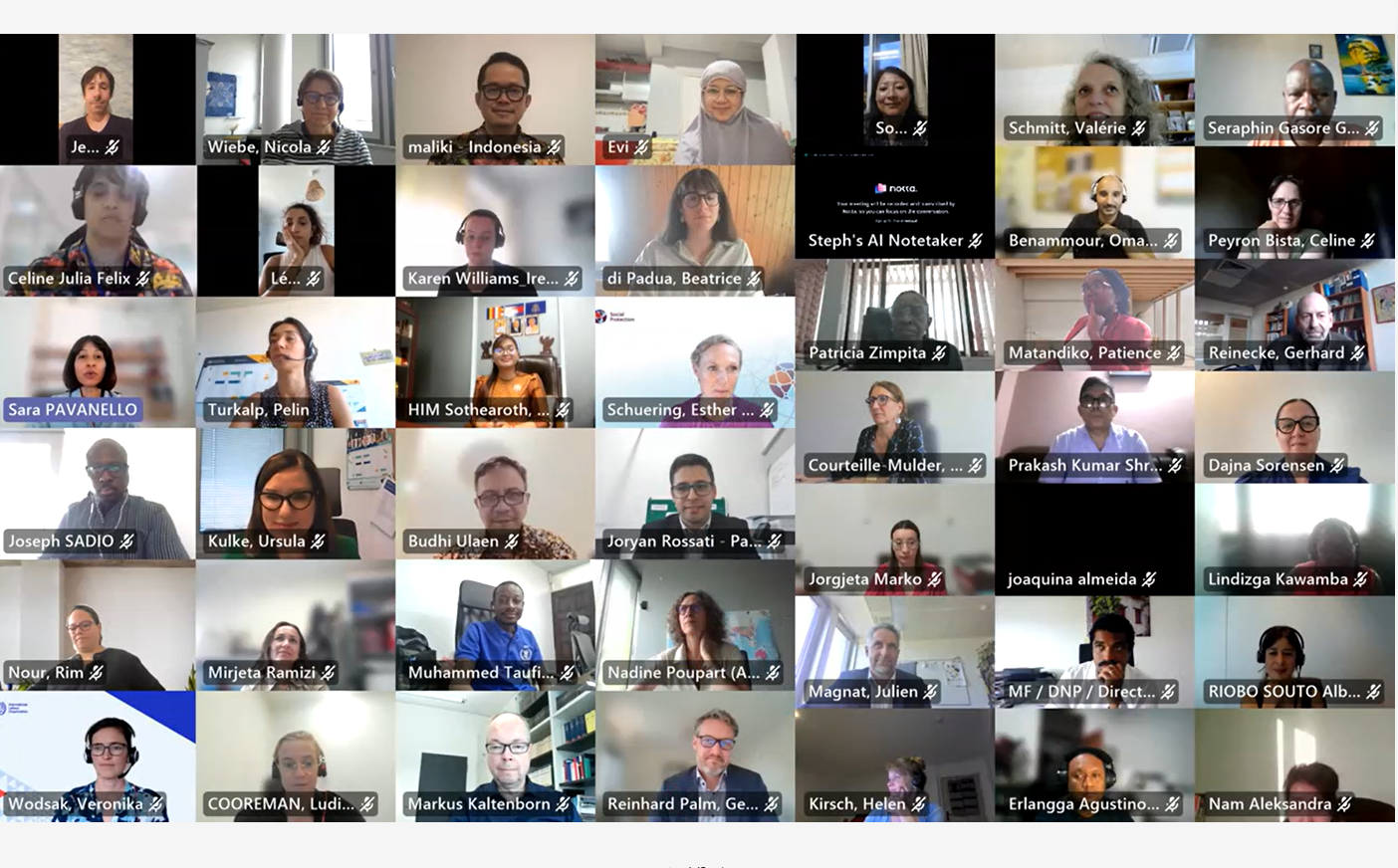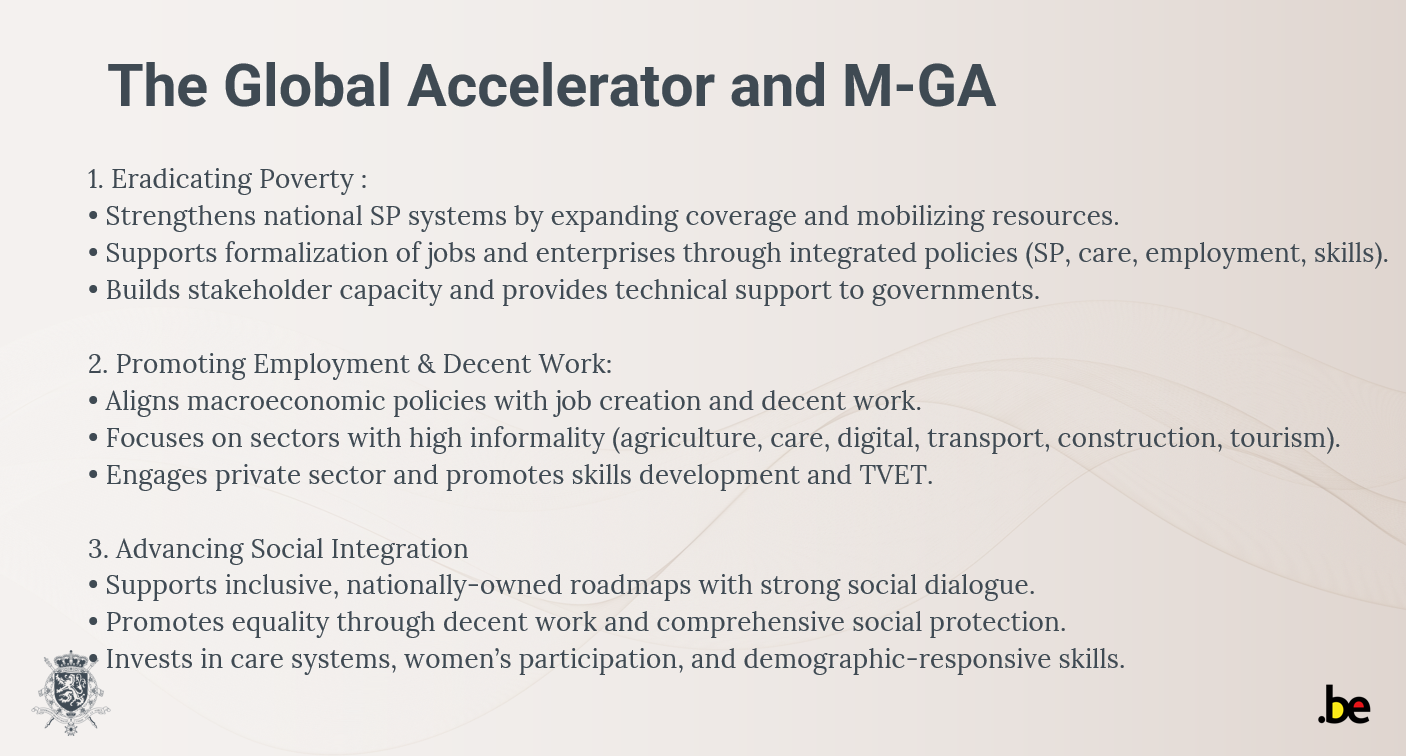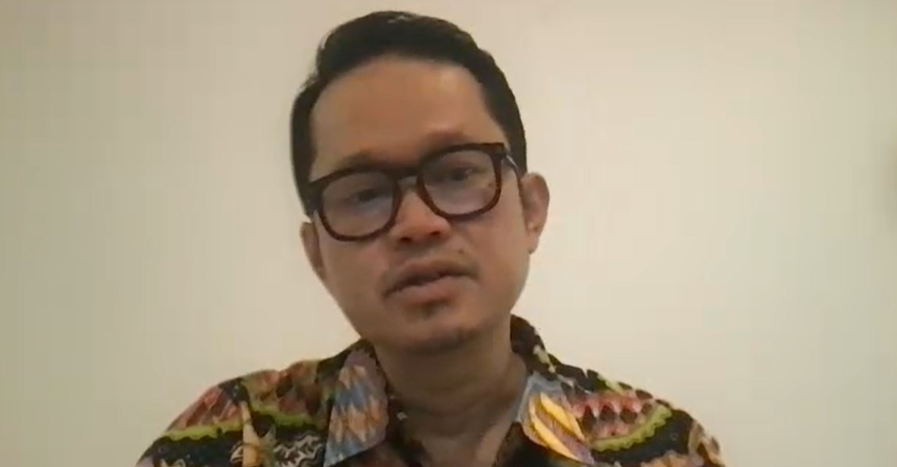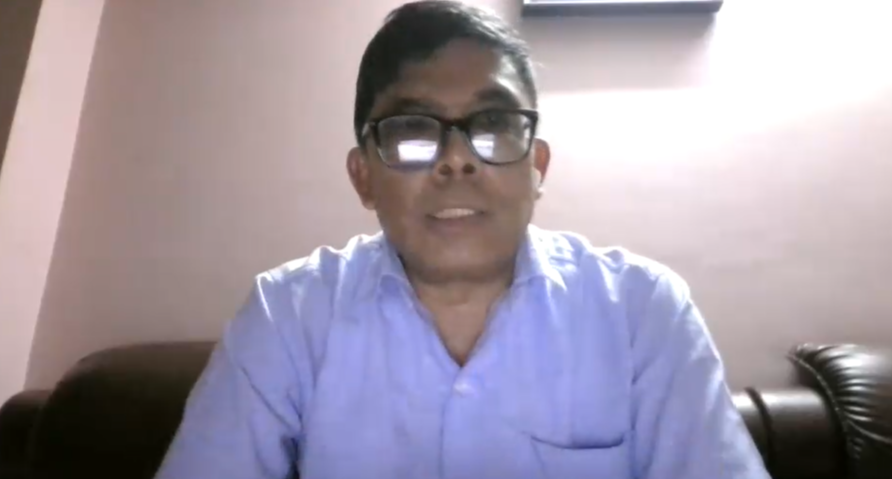Geneva - The Global Accelerator on Jobs and Social Protection for Just Transitions hosted its sixth Steering Group meeting on 17 July. It served as a powerful platform for concrete South-South exchange and learning among the 18 Pathfinder countries, which have begun showcasing their results.

Advocacy: From Sevilla to Doha
The first half of the meeting spotlighted the growing political traction around the Global Accelerator in the context of multilateralism and development cooperation. Cabo Verde and Namibia, who participated in the Global Accelerator’s side event at the 4th Financing for Development (FfD4) conference, emphasized the importance of investments in social protection and employment, yielding long-term results for sustainable development.
“Cabo Verde is in the process of graduating from low-middle-income to upper-middle-income status, and the Global Accelerator can enable us to make this increase in income level a part of the social inclusion,” said Mr Gilson Pina, National Planning Director, Ministry of Finance.
Although the Compromiso de Sevilla mentions the importance of financing employment and social protection, this outcome document is non-binding which makes accountability a challenge, noted Mr Mahongora Kavihuha, Secretary General of the Trade Union Congress of Namibia, and Workers’ representative of the Global Accelerator Steering Group, in his remarks.
Over the past decade, significant progress has been made in poverty eradication and improving health and educational outcomes; yet persistent inequalities in income, opportunity, and access remain. Ahead of the Second World Summit for Social Development, the Political Declaration has been released, whose ambition is to promote real-world action. “The WSSD has three dimensions of eradicating poverty, promoting employment and decent work and advancing social integration. The Global Accelerator and its partnership with the World Bank as the M-GA contribute to all three dimensions,” affirmed Ms Nadia Flécheux, Ministry of Foreign Affairs, Foreign Trade and Development Cooperation, Belgium.

Ms Claire Courteille-Mulder, Senior Advisor, World Social Summit, ILO, underlined four concrete ways in which the Global Accelerator responds to the WSSD2 Political Declaration and Call to Action. These are (i) a whole of government and whole of society approach, (ii) a ‘new spirit on social development’ which the Global Accelerator promotes, in line with ILO’s clarion call for a new social contract, (iii) better coordination between the IFIs and the UN, which is the linchpin of the Global Accelerator and the M-GA partnership and (iv) action-oriented initiatives, which the Global Accelerator fundamentally is. “It is a moment to show action, of how the declaration can be put into reality,” echoed Reinhard Palm, Senior Advisor - Social Protection, BMZ Germany.
The G20 under South Africa’s presidency is also advocating for social protection as one of its three main priorities, further emphasizing the Global Accelerator’s relevance and importance, stated Ms. Marta Pedrajas. Assistant Deputy Director for Development Policies, Ministry of Foreign Affairs, European Union and Cooperation, Spain. She also emphasized Spain’s strong commitment to the monitoring of social protection extension and progress of the Global Accelerator as part of the Sevilla Platform for Action.
Tying this together, Jérémie Petit, Ministère des Affaires étrangères, France signalled the possibility of a Forum for Solutions that France is looking to convene at the WSSD2, which will allow countries and partners from civil society and international organizations to showcase further commitments from the deliverables of the Summit.
The Global Accelerator’s Technical Support Facility (TSF) presented a preliminary draft of a possible WSSD2 side event on jobs and social protection, highlighting the Global Accelerator and M-GA as concrete solutions. The TSF called Steering Group members to endorse and support this proposal before it is submitted officially.
The Global Accelerator in action
The meeting also demonstrated real results on the ground. Several countries have drafted and endorsed roadmaps, while others are almost a year into implementing the UN joint programmes, funded by the Global Accelerator and the UN-World Bank partnership, the M-GA. The roadmaps are critical for governments to coordinate action aligned with its development priorities, and they provide a framework for the UN, international financial institutions, and development and social partners to provide technical guidance and financial support. “Indonesia launched its roadmap in June, reaffirming the country’s commitment to tackling poverty, inequality, informality and the challenges of climate and digital transitions, by putting people at the center of economic transformations,” said Pak Maliki, Deputy Minister for Community Empowerment, Population and Employment, Ministry of National Development Planning/Bappenas, Indonesia.

Government representatives from the pathfinder countries provided evidence of the relevance of the Global Accelerator for their national development plans, with a focus on policy integration. As part of its financing strategy for the Global Accelerator roadmap, Cambodia is currently employing an integrated approach to review and analyze its social protection and employment expenditures. The country is also developing and piloting a National Active Labour Market Policy, which will be linked to social protection benefits. “The initiative is serving as a catalyst in fostering policy coherence, institutional alignment and inclusive delivery, enabling the government to pursue greater synergy among our national strategies and action plans,” remarked Ms Him Sothearoth, Under Secretary of State, Ministry of Labour and Vocational Training, Cambodia.

Paraguay has launched a programme that connects youth to job opportunities, training, and employment through a national platform. The government supports social security contributions for up to 12 months to encourage hiring young workers and ease their transition into the labour market. “Paraguay sees the Global Accelerator not only as a platform for technical cooperation but as a global alliance to drive systemic change and we reaffirm our commitment in this process and our willingness to share experiences and learn from the community of countries engaged,” said Joryan Rossati, Director General for Planning and Cooperation, Ministry of Employment, Paraguay, to close his statement.
The ILO has developed the Structural Model for Sustainable Development (SMSD) Framework, an ex-ante quantitative tool for evaluating economic policies and investments, with a focus on sustainability and social impact. Governments and development banks can use SMSD to assess their interventions to increase the social impact of economic development. “SMSD links the macroeconomic and microeconomic; it will help us assess projects and investments before they are signed, to know the potential for employment creation and poverty reduction,” stated Mr. Souleymane Diallo, Director General for Planning and Economic Policy, Ministry of Economy, Planning and Cooperation, Senegal. Other countries, such as the Philippines and Cambodia, have also expressed their interest in using the SMSD.
Governments shared how they are realizing multilateral cooperation ensuring the ambitions of social partners are reflected in their roadmaps and technical and financial partners are integrated into the implementation process. Reducing fragmentation and ensuring policy coherence is the core mandate of the Global Accelerator to improve the efficiency of existing systems. “The existing social protection system has many duplications which shows the existing system needs reform,” stated Mr Prakash Shrestha, Member, National Planning Commission, Nepal, when making the case for policy integration.

More Pathfinder countries are currently finalizing their national roadmaps and implementing much-needed policy reforms on social protection and jobs in the context of economic transformations, climate change, demographic shifts, and in fragile contexts. The Global Accelerator Steering Group is the forum where pathfinder countries – represented by governments and social partners – together with civil society organizations, UN, donors and IFIs – can convene and share progress made, challenges and opportunities, and collectively prepare joint advocacy messages based on evidence that can influence global policy making through FFD4, WSSD2, G20 and the post-2030 agenda.
On 17 July 2025, the Global Accelerator's sixth Steering Group meeting convened over 100 representatives from governments of pathfinder countries, along with social partners, public development banks, development partners, civil society, and United Nations agencies, as well as donors.